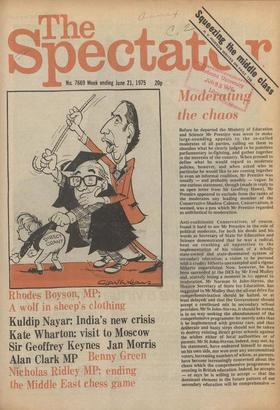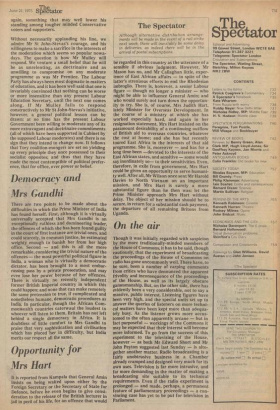Modetattng the chaos
Before he departed the Ministry of Education and Science Mr Prentice was wont to make large-sounding appeals to the so-called moderates of all parties, calling on them to abandon what he clearly judged to be pointless parliamentary in-fighting, and gather together in the interests of the country. When pressed to define what he would regard as moderate policies, however, and when asked who in particular he would like to see coming together in even an informal coalition, Mr Prentice was usually — and probably sensibly — vague. In one curious statement, though (made in reply to an open letter from Sir Geoffrey Howe), Mr Prentice appeared to exclude from the ranks of the moderates any leading member of the Conservative Shadow Cabinet. Conservatism, it seemed, was a pox which Mr Prentice regarded as antithetical to moderation.
Anti-coalitionist Conservatives, of course, found it hard to see Mr Prentice in the role of political moderate, for both his deeds and his words as Secretary of State for Education and Science demonstrated that he was a radical, bent on crushing all opposition to the implementation of his vision of a wholly state-owned and state-dominated system of secondary education; a vision to be pursued with a crudity hitherto unexampled and a rigour hitherto unparalleled. Now, however, he has been succeeded at the DES by Mr Fred Mulley and, scarcely losing a moment in his appeal to moderation, Mr Norman St John-Stevas, the Shadow Secretary of State for Education, has suggested to Mr Mulley that the all-out drive for comprehensivisation should be halted, or at least delayed; and that the Government should accept a continued mix in secondary school provision. Mr St John-Stevas, it should be noted, is in no way seeking the abandonment of the comprehensive programme: he merely asks that it be implemented with greater care, and that deliberate and hasty steps should not be taken to destroy existing direct grant schools against the wishes either of local authorities or of parents. Mr St John-Stevas, indeed, may not, by his statement, have endeared himself to many on his own side, nor won over any uncommitted voters, increasing numbers of whom, as parents, have become increasingly concerned about the chaos which the comprehensive programme is creating in British education. Indeed, he accepts — or says he is willing to accept — that the dominant element in the future pattern of our secondary education will be comprehensive — again, something that may well lower his standing among tougher minded Conservative voters and supporters.
Without necessarily applauding his line, we admire Mr St John-Stevas's courage, and his willingness to make a sacrifice in the interests of the moderation which seems so popular nowadays. The question is how Mr Mulley will respond. We venture a small belief that he will be as unrelenting, as doctrinaire and as unwilling to compromise on any moderate programme as was Mr Prentice. The Labour Party has always been most dogmatic in matters of education, and it has been well said that one is invariably convinced that nothing can be worse or more insensitive than any present Labour Education Secretary, until the next one comes along. If Mr Mulley fails to respond constructively to Mr St John-Stevas's initiative, however, a general political lesson can be drawn: at no time has the present Labour Government been willing to moderate any of its more extravagant and doctrinaire commitments (all of which have been supported in Cabinet by the supposed Labour moderates) and there is no sign that they intend to change now. It follows that Tory coalition-mongers are set on yielding up every principle they once possessed to their socialist opposites; and thus that they have made the most contemptible of political preference, that for office, over power or belief.



































